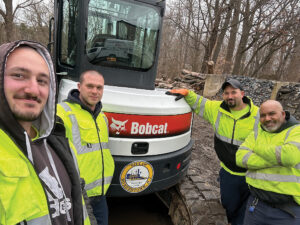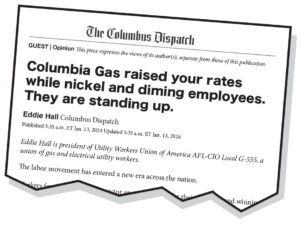New Mexico

A group of public works employees from the Village of Bosque Farms, outside of Albuquerque, chose UWUA to gain more control over their work. Five municipal workers operate the village’s water and sewerage services, maintaining 2 wells, a wastewater treatment plant, grinder pump stations, and the billing/customer service operation.

It’s a large workload that has grown more taxing with the loss of positions to attrition in recent years while the village’s population has grown. As a result, field worker Nick Gipson reports they have had to take on extra work and are backed up on installations. “We just want to be able to do our jobs properly, but the town has practices that get in the way and prevent us from providing the best service to our customers,” he said.
“We came to realize we needed the power of a union contract to make real change and sought out UWUA,” Gipson stated. He and his coworkers are working with UWUA National Representative Bob Houser to negotiate a contract that addresses economics as well as on-call practices, after-hours emergency protocols, and equipment needs.
Ohio
Louisville, nestled between Akron and Canton, Ohio, is a small city with a 14-member municipal workforce that maintains the streets, parks, and water and wastewater systems.

Bob Clapper, a 26-year employee who helped lead the organizing effort, said one of the big attractions to working for the city is that it historically afforded its employees a decent pension and a better work-life balance than typically available in the private sector. However, that’s changed in recent years.
Workers grew concerned after a new city service director started cutting benefits and hiring an excessive number of supervisors, many of whom don’t reside in Louisville. Clapper and his peers think that’s a problem: “Most of us live here. We have a vested interest in making sure this city works for both residents and those who serve them.”
Last summer, Louisville workers elected Clapper and two others to represent them in interviewing potential unions: “There are several other cities and towns in the area where workers have UWUA representation, and we were impressed with what we learned.” On January 3, they elected UWUA as their bargaining agent.
National Representative Frank Meznarich is working with a committee that includes Clapper (public works), Ben Woitas (water and wastewater) and Dante DiGacoma (parks) on a first contract. They’re seeking fair wages, recognition for licenses and certifications, protection of existing benefits, and a few additions like on-call pay and adjustments in the city’s call-out policy.
Notably, before joining the Louisville workforce, Clapper spent two decades working in a factory in Canton, where he was a member and later president of a local of the Glass, Molders, Pottery and Plastics Workers (now part of the United Steelworkers). He’s now approaching retirement, and shared, “I was in a union for the first 21 years of my full-time working life. I’ve always felt like a union man and am glad I’ll finish my career as a union man. I’m proud to be part of this great group as we start our UWUA journey.”
New Jersey

When 14 municipal workers in Bordentown saw what their peers at the town’s sewerage authority had achieved in their first contract as UWUA members, they voted to bring their independent association into the UWUA.
The group is responsible for a variety of city public works functions, including maintaining parks and grounds, sanitation, and street sweeping.
Ken Hyman, a city worker for five years and former Teamster, was one of the leaders of the organizing effort. He said the group had been looking to affiliate with a larger union for some time, and everything came together this past fall to collect cards and move forward. “We were impressed with what the workers at the Bordentown Sewerage Authority had achieved with their contract, so we reached out to the UWUA.” That group voted for UWUA representation in June 2021 and ratified a first contract in early 2022.
Hyman and his coworker Zack Steen are currently working with Local 601 to negotiate a first contract. The group is looking to eliminate favoritism, define job specifications and classifications, secure more consistency in wages, and win a guaranteed seniority structure.
Columbia Gas, Ohio
 Columbia Gas workers in Ohio are organizing in response to corporate greed and unfair treatment. UWUA already represents the company’s workers in Toledo (Local 349) and eastern Ohio (Local 436) as well as in Pennsylvania (Locals 475 and 479) and Maryland (Local 419), but there are another 500 workers in Ohio with no union representation.
Columbia Gas workers in Ohio are organizing in response to corporate greed and unfair treatment. UWUA already represents the company’s workers in Toledo (Local 349) and eastern Ohio (Local 436) as well as in Pennsylvania (Locals 475 and 479) and Maryland (Local 419), but there are another 500 workers in Ohio with no union representation.
We started outreach to these potential members following the April 2023 organizing training held in Roswell, NM. Member organizers from Ohio, Michigan, Pennsylvania, and West Virginia have been traveling the roads of Ohio to speak with workers and collect cards. In response, Columbia Gas launched a vigorous anti-union campaign. On January 13th, The Columbus Dispatch ran an editorial by Local G-555 President Eddie Hall about how Columbia Gas treats its workers and customers (link to the full article at www.uwua.net/2024/). UWUA will stand with Columbia Gas workers until they all have the opportunity to exercise their legal right to union representation.
Maine
Twelve operators of a Cogentrix natural gas combined cycle power plant in the western Maine town of Rumford voted to join UWUA over concerns about the plant’s future. Bill Calden, an operations and maintenance technician hired straight out of college in 2017, said he and his coworkers have witnessed a lot of turnover in the industry and want to ensure that their plant remains competitive. “We’ve seen the success of some of the union shops in the region. We want that for Cogentrix. We want it to be around long into the future so that we can build careers here.”
Calden and his coworker Chris Jewett are working with Boston-based Local 369 on a first contract. UWUA represents workers at Cogentrix plants in Rhode Island and Connecticut. Local 369 President Dan Leary says they’ll use Local 310’s Tiverton (RI) contract as a template because of the similarity in the work performed at the two locations. Job security and competitive wages and benefits are priorities for the group. Once finalized, the Rumford workers will become members of Local 369.

